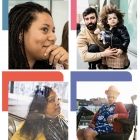Diversity Barometer Housing
Access to housing is faced with numerous pitfalls: inadequate public offer, cost of private housing, insalubrity, economic crisis, lack of suitable housing, etc. Added to this is the issue of discrimination.
Within the framework of its “Diversity Barometer” project, the Centre has initiated a research programme, in collaboration with the federal Minister for Equal Opportunities, the three regional Ministers for Housing and the Institute for the Equality of Women and Men. Two university consortiums carried out this research, aiming at assessing the extent and the forms of discrimination in both the public and private housing sector.
The Diversity Barometer project aims to elaborate a long-term, structural measurement tool to scientifically draw up an inventory of the behaviour (level of discrimination) and attitudes (level of tolerance) towards the different target groups protected by antidiscrimination laws, as well as the actual participation (level of participation) of these target groups in society. The Diversity Barometer is published every two years and analyses three sectors - employment, housing and education - which are each the subject of a publication in turn.
The Diversity Barometer therefore aims to overcome the lack of statistical and qualitative data relating to discrimination and its mechanisms and provides civil society actors with a tool comprising objective data. This data is useful and necessary for an analysis of their sector of activity and will equip political leaders with a tool to assess and manage the policies being implemented.
Comparable publications
Annual report 2020: vulnerable human rights in times of crisis

In this extraordinary year, Unia continued to fight for human rights and equality. The corona pandemic acted like a magnifying glass. Those already in a vulnerable position were often the first or hardest hit by Covid-19 or its measures.
Evaluation of federal anti-discrimination legislation (2017)
Article 52 of the Anti-Discrimination Law states that the application and effectiveness of the anti-discrimination laws must be assessed by the Legislative Chambers. Unia has prepared an assessment report on the Anti-Discrimination Law and the Anti-Racism Law based on its own practical experience, national jurisprudence and its general expertise in the fight against discrimination.
Annual report 2015. Living together put to the test.

The year 2015 left a deep mark on our society. Violent conflicts and tensions on a global scale have had a direct impact on us. As we finalise this annual report, Belgium is suffering the repercussions of the bomb attacks at Zaventem airport and Maelbeek metro station in Brussels.
Annual report 2022

In 2022, Unia continued to fight on behalf of discriminated citizens. In our annual report, we look back at our efforts to combat discrimination and promote equality in Belgium.
